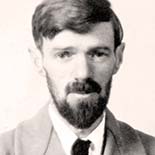 David Herbert Lawrence (September 11, 1885 – March 2, 1930) was an English writer, novelist, poet and essayist. His works reflect on modernity, industrialization, sexuality, emotional health, vitality, spontaneity and instinct. His best-known novels—Sons and Lovers, The Rainbow, Women in Love, and Lady Chatterley’s Lover— were the subject of censorship trials.
David Herbert Lawrence (September 11, 1885 – March 2, 1930) was an English writer, novelist, poet and essayist. His works reflect on modernity, industrialization, sexuality, emotional health, vitality, spontaneity and instinct. His best-known novels—Sons and Lovers, The Rainbow, Women in Love, and Lady Chatterley’s Lover— were the subject of censorship trials.
Lawrence’s opinions and artistic preferences earned him many enemies, and he endured persecution and misrepresentation of his creative work throughout the second half of his life, much of which he spent in a voluntary exile, four years of which he described as a “savage enough pilgrimage”. At the time of his death, his public reputation was that of a pornographer who had wasted his considerable talents. However, English novelist and critic E. M. Forster, in an obituary notice, challenged this widely held view, describing him as “the greatest imaginative novelist of our generation.”[2] Later, English literary critic F. R. Leavis also championed both his artistic integrity and his moral seriousness.
LEDA
D. H. Lawrence
Far-off
at the core of space
at the quick
of time
beats
and goes still
the great swan upon the waters of all endings
the swan within vast chaos, within the electron.
For us
no longer he swims calmly
nor clacks across the forces furrowing a great gay trail
of happy energy,
nor is he nesting passive upon the atoms,
nor flying north desolative icewards
to the sleep of ice,
nor feeding in the marshes,
nor honking horn-like into the twilight.
But he stoops, now
in the dark
upon us;
he is treading our women
and we men are put out
as the vast white bird
furrows our featherless women
with unknown shocks
and stamps his black marsh-feet on their white and marshy flesh.